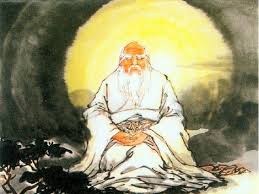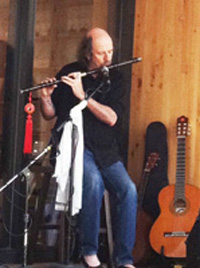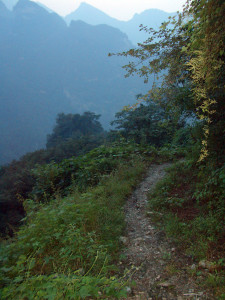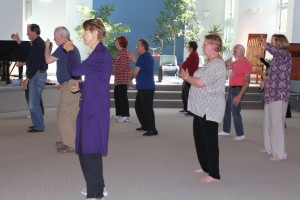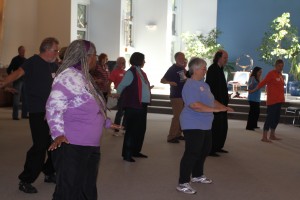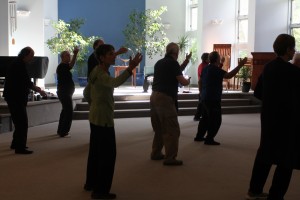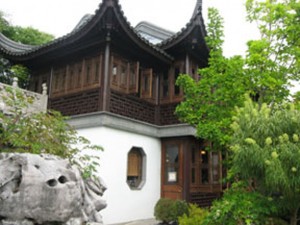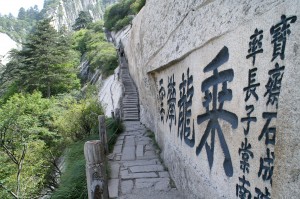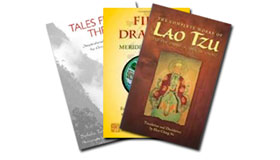If is when we give up our personal views that we see things as they truly are. In seeing things as they truly are we arrive at complete understanding. To reach complete understanding is to reach true happiness. To reach true happiness is to reach completion. To reach completion is to enter Dao
Zhuangzi (Chuang Tzu)
Not long ago I came across an article about the passing of one of the baddest dudes in rock, Lou Reed. I used to see his early band, The Velvet Underground, in the late sixties in Boston. At a time when many of the bands, and the audience, wore flowing colors with flowers in our hair, the Velvet Underground wore black and played a fierce kind of music, with lots of feedback. I thought they were great.
Lou played on for many years, always staying true to his own vision and passion of music, most of which was too intense for me. A few years ago I heard that he was a serious taiji student, though I had no idea how serious. As it turns out he practiced for hours of every day and was a man of deep and generous heart who loved his music and his life, both with a fierce passion.
When I read the following description of his death I was moved to tears and so inspired by this old lion of rock, who’s transition was done with such elegance and grace. Here’s what his partner, Laurie Anderson, another renowned musician, said:
As meditators, we had prepared for this – how to move the energy up from the belly and into the heart and out through the head. I have never seen an expression as full of wonder as Lou’s as he died. His hands were doing the water-flowing 21-form of tai chi. His eyes were wide open. I was holding in my arms the person I loved the most in the world, and talking to him as he died. His heart stopped. He wasn’t afraid. I had gotten to walk with him to the end of the world. Life – so beautiful, painful and dazzling – does not get better than that. And death? I believe that the purpose of death is the release of love.
I would wish this kind of passing for everyone. I think it shows that Lou was indeed a master of taiji – of going with the flow and offering the least amount of resistance while achieving a very high level of practice. It is one thing to espouse the deep teachings of taji but quite another to actually apply them in such an amazing way.
Zhuangzi says:
We are born when it is our time and we die when it is own time, If we are able to just follow the flow of nature then we will transcend joy and sorrow. This is what the ancient masters called “true freedom.”
It is in our coming and going, in each lifetime, in each moment, that we are given the choice to flow with change or fight against it. Each new day, each new moment of each new day, there is a dying and a being born. The circle of life takes us all on a journey around birth, death, rebirth. We are given so many new chances, new opportunities, new “do-overs.” If we don’t get it right each time, no matter. What matters is that we are open to change, to each wonderful moment of rebirth, even in the moment of our death.
May we all go from this world to the next with such grace and courage as Lou Reed!
The season of winter is connected with the element water, the color blue black or black, and the organs kidneys and bladder. It is also called the time of year of “Returning to the Root.”
The kidneys are associated with the positive emotional state of will or what used to be called “backbone.” The negative emotional state is fear, especially unfounded fear such as panic attacks or night sweats. A weakness in the kidneys can also cause this problem so it is especially important to take care of our kidney energy this time of year.
The kidneys are said to be the repository of our jing or energetic essence as well as our sexual energy. This is why it is important more men to be a little more restrained about ejaculation this time of year (see chapter ).
It is also, unless we live in southern climates, a cold time of year so it is important to keep ourselves warm by paying attention to what we wear outside. Warming foods such as hot soup and cooked foods are also important.
Winter, the season of quiet contemplation, is an excellent time to strengthen our meditation practice. By being still, by being quiet, by closing down the outside influences in our lives, we can open doors to vast inner worlds. It is in this serene and tranquil mind that we can discover Dao, our source as well as our destination.
The ancient Daoist sages described the body as the storehouse of our inner nature. They taught that we must take care of the body in order for us to have a place for our spirit to dwell. It is important not to neglect our stillness practice if we are to fully enjoy the benefits of our movement practice. Like yin and yang, both movement and stillness are important to our overall cultivation.
Daoists believe that it is important to keep a balance between movement and stillness. Too much movement will exhaust one’s qi, while excessive sitting will cause stagnation in the body. The key here is to not abandon one for the other and to experiment and see what is the proper balance for your own cultivation.
Like yin within yang, or stillness within movement, that place of serene stillness within our movement gives birth to that subtle and mysterious movement within the stillness of our meditation. That movement brings us into greater harmony, greater awareness, and greater experience of the eternal and ever-evolving Dao.
In many traditional societies winter is the time to stay close to the fire, sharing food and stories with families and friends during the long, cold, days of winter.
Just back from my mini-tour of the east coast, teaching Sound Healing and Primordial (Wuji) Qigong in NJ and CT with a stop over in RI to see an old friend. My classes were full, my hosts were fabulous and it was mid october in New England, the land of my birth, which was colorful and gorgeous.
It is such a blessing to be able to share this ancient Daoist qigong form with others. It puts you into such a receptive, open state. I have been doing this form for over 15 years now, have done it thousands of times, and still never get tired of it. And to be able to share that magical space with others is such a golden opportunity.
I hope to do more traveling and sharing both qigong and sound healing. If anyone out there wants to sponsor a workshop let me know and we can work out the details. Qigong quite literally saved my life and it is an honor to be able to pass that precious knowledge on to others. Below is some video from the class in CT.
Here is a qigong poem I wrote some time ago that, to me, says it all.
The Qigong State of Mind
The qigong state of mind is one of complete relaxation.
The qigong state of mind is one of complete acceptance.
The qigong state of mind is one of openness to the healing energy of the universe.
The qigong state of mind is one of the knowledge of the soft overcoming the hard.
The qigong state of mind is one of becoming one with Tao, in all its unmanifest as well as manifest aspects.
The qigong state of mind is one of constant renewal and rebirth.
The qigong state of mind is one of joy and beneficence.
The qigong state of mind is one of deep meditation.
The qigong state of mind is one of love and healing for the whole world.
My personal practice these days consists, in a large part, in something I call Looking Up. By Looking Up I mean to, number one, physically look up. It is amazing how often we travel down the road or even across our yard or across the street, all the while looking straight ahead, if not down at our feet. When we look up we see the blue, blue sky above us, with the bright shards of sunlight flowing down to us. Or else we see the great billowing clouds, all full of the promise of rain to make all things on our planet grow and flourish. Or else we might see the rain itself, falling down into our open eyes and perhaps, open mouth. Or we might see the tops of the trees swaying slowly in the breeze, reaching into the sky, connecting from their deeply entrenched roots down in the great yin of mother earth and then stretching up higher and higher into the great yang of the heavens.
It is just a wonderful practice to notice what we don’t usually see when we are walking or driving along. The tops of old buildings in many cities are covered with wonderful designs. Even just the sight of the rooftops of the buildings around us, as they blend in with the line of the sky behind them can be beautiful. We might see birds swooping around in the tops of the trees or on the rooftops or even on the tops of electrical lines.
And, of course, as with all real practices, we can take it a step further and use the concept of looking up in our own lives. It is often when we become obsessed or distraught by the small details of our lives that we lose the big picture. If we can, in our moments of stress or depression, we need to take a look up to become more aware of our lives in all their grandeur. When we are looking at a more objective view from on high we can see how each little moment comes together to form the amazing and beautiful mosaic of our lives. And while it is true that many of these moments contain lots of pain and suffering, we can also get a grander view if we only practice looking up. In that looking up, we can perhaps see the pattern more clearly and in this way we can learn to let go of the small stuff and focus on the whole journey rather than each individual step.
Laozi says we suffer because we have a limited sense of self. The Buddha also said life contains suffering because of our attachment to having things the way we want them to be rather than of the way they are. By using the teachings of these two great masters we can, perhaps, take this long and high view of our selves and of the world we find ourselves in. And in that way we can free ourselves from our earthly-bound material body selves and find ourselves soaring and swooping through the blue, blue sky like a bird on the wing.
Looking Up also means looking at the big picture, something we are not trained to do in our modern fragmented society. Most of us are stuck in our own extremely narrow worldview. We are more interested in what is happening in our own small part of the universe.
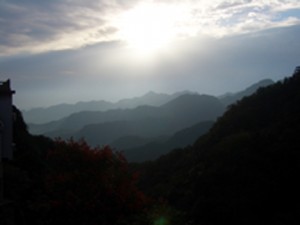
Summer comes slowly to us here in rainy Oregon. It often rains right up til the fourth of July. Everyone wonders, sick of the dark rainy days and wishing for the sun, when and if it will ever happen. Yet it always does.
Lots of death coming to lots of people we know – partners having major strokes, dads dying of cancer one week after diagnosis, old friends on their way out into the great void. It reminds us that things can change in a moment. One moment we’re riding high, the next we are on our knees. It happens to everyone. As the famous country singer Hank Williams sang, “No one gets out of here alive.” But really, we would rather it come another day, another moment.
Laozi says:
Heaven and earth or not benevolent.
They treat all things as straw dogs.
The sage is not benevolent.
She treats all other beings as sraw dogs.
The space between heaven and earth
is like a bellows.
It is empty yet never exhausted.
Always in motion,
yet always producing more.
Fewer words are better than many.
It is best to abide in our true nature.
5
As Daoists, we don’t believe in a personalized godhead who will take care of all our troubles if we just go down on our knees to him/her. We realize that Dao is deeply impersonal while we live in a deeply personal world. Nature is impersonal, it doesn’t really get too worked up when it delivers a flood or a tornado. Straw dogs were used in ancient Chinese ritual, thrown into the fire to take away the negativity of the people. All that negativity going up in flames, leaving behind the positive clearness of the now. Of course the next moment can be filled with negativity yet Dao is always in motion, never exhausted. Our lives are but small drops in an infinite sea but when they are over we are the sea.
Don’t talk too much, says the Old Boy. Use fewer words, less energy, long and deep breaths, no sense in asking for more than we can handle, no sense in trying to control every minute of every life. Best to abide in our true undying nature. That way, we never suffer loss but embrace it willingly.
In Chapter 9 of the Daode Jing Laozi says,
Overfilling a vessel is not as good as stopping before it is filled.
Oversharpen a blade and it will lose its edge.
Pile up gold and jade
and it will be impossible to guard it.
In going after rank and titles
in an arrogant and haughty way
you will bring about your own downfall.
Withdraw when the work is done.
This is the way of Dao.
It is so easy to overdo things in our modern fast-paced world. Whether it is food, drink, sex, work, exercise or even meditation – these are all opportunites to over do. It is the opposite of what Laozi teaches – the Way of wu wei (not doing). Of course, what one person experiences of overdoing may not be too much for another person. In order for us to really follow the Way of wu wei we need to learn just what are our limits and how not to go beyond them. This takes time and attention, two things that are also problematical for modern people.
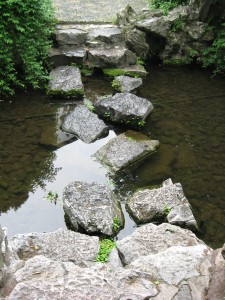 There is a famous passage from Laozi that says:
There is a famous passage from Laozi that says:
A journey of a thousand miles
begins with the first step.
That first step is a big one however!
He also says:
Those who stand on tiptoes
cannot balance themselves.
Those who take too long a stride
cannot walk far.
Those who show off
are not enlightened.
Those who are too aggressive
will not accomplish anything great.
Those who boast too much
will not endure.
Those who follow Dao call these things
over-consumption and useless activity.
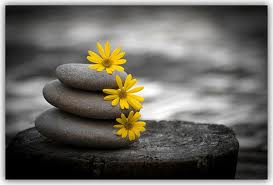
Solala’s Blog for week of 3/11/13
The Daphne is blooming, sending its magical fragrance into the air, flowers are popping up in the middle of the lawn and our beloved grandmother willow tree is greening more each day. It seems that winter is transforming into spring, always miraculous, tho I have seen it happen countless times (well, 62 anyway)! I love the changing the seasons, as many of us do. What is it that makes us so happy and excited about each round of the year? Winter in the Pacific Northwest is pretty cloudy and rainy, even dark. Many people around here go into a deep funk when the sun goes away but I guess I am just used to it and it doesn’t really bother me. Yet I am always overjoyed when spring comes round again and things begin budding and blooming.
The path of Dao is at once the universal pageant of the constellations and the budding of each new leaf in the spring. It is the constant round of life and death all that falls in between. It resides in us and we reside in it. It is the source as well as the end of our being. It neither judges nor condemns but continually blesses, in all moments – an unending cycle of change and renewal.
I just found out yesterday that my book on spiritual relationship, Sacred Union, will be published by Sounds True, the home of many fine authors, teachers and musicians! I feel my own inner spring buds beginning to unfurl and push their way up to the sun!
It will soon be time to begin getting the garden ready for planting. Of course, as Daoists, our own internal cultivation is a steady and ongoing project. Our spiritual seedlings need to be take care of carefully so that they may grow to become great and beautiful flowers. Yet too much interfering and things may not grow well at all.
Laozi says,
Those who desire to control heaven and earth
will not succeed.
The universe is sacred.
One cannot grasp it or control it.
Those who attempt to control it
Would ruin it.
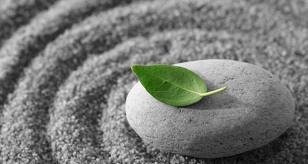
Solala’s Blog for the week of 2/25
My computer died a week and a half ago and I have been mourning it ever since. I have been without a computer and have had to borrow my girlfriend’s as a back up. Unfortunately, none of my programs are on it and I cannot do the usual projects. It is amazing how much I depend on it!
Of course I don’t need a computer do practice qigong or meditation. These things are very old-age and don’t required any special equipment or clothing. Just go within, plug into the great unending, ever unfolding Dao and there you are! Laozi says:
Can you hold the body and spirit as one?
Can you avoid their separation?
Concentrating your qi
And becoming pliant,
can you become like a newborn baby?
Clearing your mind and
contemplating the profound
can you remain unflawed?
In understanding all things
can you remain apart from them?
Can you bear the fruit without taking possession of it?
Can you do the work without taking credit?
Can you act without taking control?
Can you lead without dominating?
Can you speak without speaking?
Can you sit without moving?
One of the things that drew me to Daoism is the emphasis on using the energetics of the body to go beyond the body. Daoists fully inhabit their body yet also explore what lies beyond our mortal shell. But it does take a willingness to “sit without moving” and to learn to “speak without speaking.”
It can take a long time, as it has with me, to really understand these kinds of principles and then put them into practice. It can take a lot of effort to reach the state of wu wei or effortlessness. It seems so very simple to follow the we wei way but in the beginning as least, it takes a tremendous act of will to open ourselves up to the state of being able to “hold our body and spirit as one.” But the rewards are huge and the journey is as exciting as the goal.
My girlfriend Shanti and I had breakfast this sunday with our lovely friend Tegra. She shared with us her “not to do” list she does almost every day. Such as “Don’t get uptight about not getting too much done today.” If that isn’t the wu wei way I don’t know what is!
So I am working on my “not to do” list this week as well. Tomorrow the new computer arrives and I get to immerse myself in getting caught up on projects. But I will take my time, linger awhile on things and feelings “in between” and hopefully, experience some of that advice of the old master on “doing without taking control” and, every once in awhile, practice “speaking without speaking” and “sitting without moving.”
